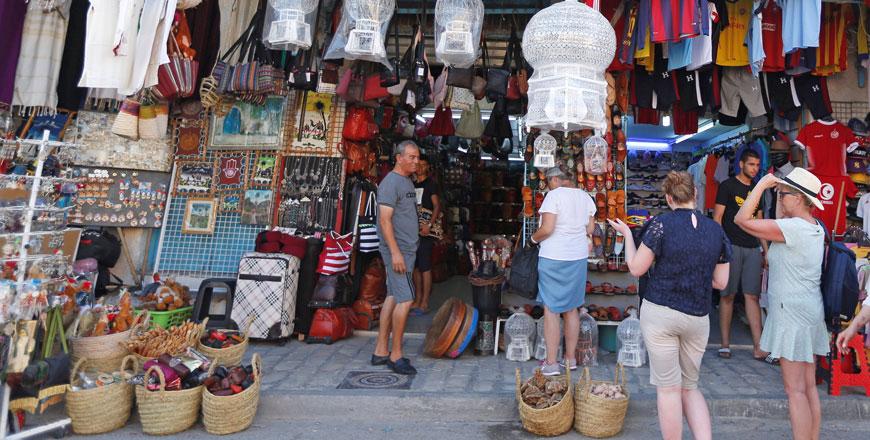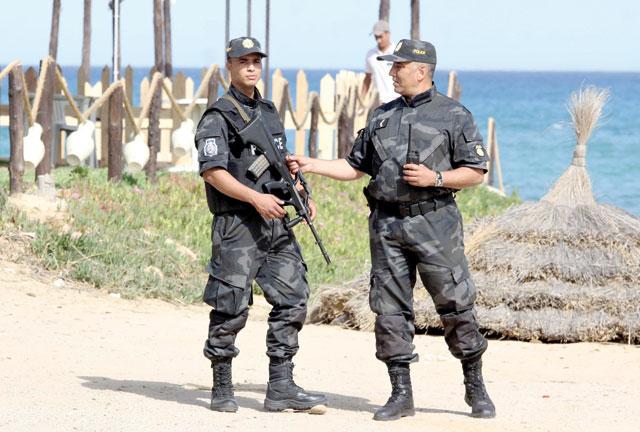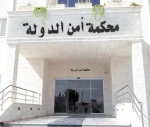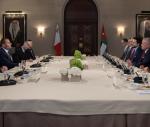You are here
Tunisia sees tourism take off after terror fears
By AFP - Jul 14,2018 - Last updated at Jul 14,2018

Russian tourists are seen shopping at the old medina in Sousse, Tunisia, on June 22 (Reuters photo)
HAMMAMET, Tunisia — Holidaymakers are returning to the Tunisian seaside this summer in a marked turnaround three years since dozens of tourists were killed on one of the country’s beaches.
Relaxing by the pool with a whiskey in hand, Steve was thrilled with the affordability of his 10-day break.
“The same price I [would] stay for four days in Paris or Amsterdam. It’s cheaper to be here. You have got everything,” said the IT engineer, holidaying in Tunisia’s Hammamet.
Just three years ago in the nearby coastal resort of Sousse, 38 people were killed in a shooting rampage targeting tourists, while earlier in 2015 an attack on the National Bardo Museum in Tunis left 22 people dead.
The terror attacks decimated Tunisia’s crucial tourism sector, which made up 7 per cent of the gross domestic product and had already been shaken by the country’s 2011 revolution.
Tour operators scrapped their package holidays and numerous countries warned their citizens against travelling to the North African nation.
Tunisia remains under a state of emergency and an attack this month along the border with Algeria, which left six members of the security forces dead, is a reminder of the challenge the country faces.
The authorities have been working hard to draw foreign visitors back to their sandy shores and, in recognising the improved security situation, numerous embassies have overturned their 2015 travel notices.
Surveillance cameras have been installed in holiday hotspots, while private security staff are stationed at beach entrances and armed police patrol tourist zones.
‘Real recovery’
The measures appear to be working, with the tourism ministry registering more than three million visitors in the first half of 2018, surpassing arrivals in the first six months of the benchmark year 2010.
“It’s the year for real recovery,” Tourism Minister Selma Elloumi Rekik said in May.
“In 2018 we will exceed eight million arrivals with growth in the Russian and Chinese market, as well as that of the traditional market,” notably of French and German tourists, she told AFP.
Tour operator Thomas Cook, which suspended its Tunisia holidays in the wake of the June 2015 attack, resumed operations in February and said it has more than tripled summer flights due to customer demand.
The number of British tourists has more than doubled since last year, with over 30,000 holidaymakers between January and May, according to the British embassy.
“Honestly, I recommend coming to Tunisia, drop Spain and the Canary Islands,” said Steve, who had travelled from Ireland for the “guaranteed sun”.
“I feel safe here,” he added at the poolside.
Russian holidaymakers
Tourism is crucial to the country’s economy and the return of foreign cash comes at a vital time, as Tunisians grapple with high unemployment, inflation and the falling value of the dinar.
Seeking to attract holidaymakers from further afield, Tunisia saw the first charter flights arrive from China after lifting visa requirements for Chinese travellers.
The tourism ministry has also taken advantage of Tunisia’s participation in the World Cup, launching advertising campaigns in the Russian cities where the team played matches.
But although the uptick in tourism has been welcomed, hoteliers are still waiting to see the financial benefits.
“In terms of profitability it’s wide of the mark,” said Haikel Akrout, director of the four-star Khayam Hotel which is popular among Russian tourists.
Holiday prices have fallen for tourists, while their hosts are absorbing the increasing costs of essentials such as food and fuel.
Tourism revenue reached 1.29 billion dinars ($490 million, 420 million euros) for the first half of this year, falling short of earnings for the same period in 2010, while the number of nights booked is significantly lower.
While Europeans stayed away, Akrout began looking elsewhere for guests: “Before 2015 we worked a lot on the European market, but afterwards new markets opened up: Algerian, Russian”.
With his children playing on a huge swimming pool slide, Russian engineer Sergei said he is one such newcomer to the Tunisian coast.
“I think that I will recommend this hotel to my friends,” he said, praising the service and price of his holiday, before he returns to his city of Tver, northwest of Moscow.
Related Articles
HAMMAMET, Tunisia — Policemen on horseback amble among the sunbathers and new metal detectors dot hotel entrances in Tunisia as the North Af
TUNIS — Thirty Britons and eight other foreigners were killed last Friday when a gunman opened fire on holiday-makers at a Tunisian hotel, T
LA GOULETTE, Tunisia — A celebratory band played as a cruise liner docked Thursday in the port of Tunis for the first time since a March 201
















